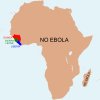Spoonieduck, seems you are really painting a dark picture of Africa, your scenario about contacting HIV, seems like a one in a billion chance...I certainly don't put my clients in a "multi-passenger" taxi, don't know of any other hunting outfitter that would.
Bilharzia, I have never met any one or heard of any one getting the disease. And I have waded through enough swamps in my life and still will.
Malaria, that is one to worry about, but very treatable. I have had malaria twice in my 13 years of hunting in Mozambique. I don't take any anti-malaria pills because of the amount of time I am there. The first time I got malaria, I was still in Mozambique, cost me about 5 dollars to be treated, second time I only got the malaria once back in South Africa, nine days later, cost over 500 dollars to treat. If you been in a malaria area and feel as though you got flu symptoms just get tested for malaria. Malaria does kill but in real remote rural areas.
Tick bite fever....if you can handle a hangover, you will survive tick bite fever..Q-fever..?
One that does make me nervous is lead poisoning...had two bullets between my legs and three past the ear.
In terms of bilharzia, it is, indeed, a common infection although likely most people don't know they are infected. The parasite load tends to increase over the years due to multiple exposures. The people most at risk are farmers who spend a lot of time exposed to irrigation water and commercial fresh water fishermen. Generally speaking, most infected people are asymptomatic or only experience bouts of non-specific malaise--flu-like symptoms. Only the most severely infected show hematuria [blood in urine], bouts of chronic urinary tract infections and urinary tract cancer.
Now, there is a bilharzia-like condition in the U.S. but the symptoms are minor. There's a schistosomal parasite that's primary host is certain waterfowl. The parasitic cycle is bird to water snail back to birds. The parasite is not adapted to human beings, but the larvae have a try at it. The larvae are capable of penetrating human skin but human host resistance stops it on the spot. The larva dies producing a skin reaction resembling [and feeling like] chigger [red bug] bites. I have a couple of ponds frequented by numerous waterfowl. Twice I've had to go diving for lost fishing poles. All of my skin--face, arms, legs--not covered by clothing had a couple of dozens of schistosome "bites". I no longer go diving in my ponds.
African tick bite fever can be prevented with adequate prophylactic antibiotics. Even should a person become infected [with or without prophylaxis], he can be readily cured with appropriate antibiotics. Real problems arise, however, should the infected person not recognize that he is infected and therefore fails to get prompt treatment. Such individuals may experience chronic problems for years. It's a bit like Lyme Disease--also caused by a tick-borne bacterium. If it's treated promptly, complete cure. If it's missed, even appropriate antibiotics may not clear the bacterium from the victim's system. Q-Fever shows a similar pattern. It won't kill you but should the victim not be appropriately treated, he may have significant long-term problems.
Malaria? Most cases of malaria in southern Africa are Falciparum malaria--the worst variety. It is responsible for black water fever and cerebral malaria. There is real mortality. There is also no immunity even should you survive a case. I think we should all take prophylactic meds when in significantly malarious regions. One problem is, though, that in most areas of southern Africa there are only a few cases of malaria. Also, most malaria prophylactic drugs have certain side effects. Should a person take drugs with real side effects to avoid a remote chance of malaria? I generally don't because I've had problems with some of these drugs. So far, I've gotten away with it.
Another "cute" infection is Sleeping Sickness transmitted by tsetse flies. This disease is due to a microscopic trypanosome parasite. It causes Nagana--almost 100% lethal in livestock--but wild game is apparently immune to it. A mutant version of the same parasite causes sleeping sickness in humans. I've seen only one case and that was in a doctor's son. They were hunting in Botswanna. The father, who knew they'd been bitten by tsetse flies, immediately broke off the safari when his son fell ill. On the trip back, the boy's blood was tested a couple of times. When he arrived at my hospital, I examined his blood smear. It was loaded with trypanosome parasites. We got him on an experimental drug and he survived. Now I've been bitten by tsetse flies many times and have never had a problem. Then again, I probably never hit a real hot one.
In terms of lead poisoning, you made a joke but hit on something, anyway. People who are shot--even with lead bullets or fragments remaining in their bodies--rarely get lead poisoning. I think this is because the foreign body is quickly walled off by scar tissue with few blood vessels. The lead is then unavailable for absorption into the system. The rare exceptions are those people who have bullets in joint or body cavities. The lead bullet may them move around relatively freely and small amounts of surface lead oxides may be absorbed directly through the delicate membranes that line these cavities. I hope so, anyway, because I've been shot a couple of times, myself.
 and i would love to see you try and take a vundu standing chest deep in water, as i have a sneaking suspicion it would take you for a ride instead
and i would love to see you try and take a vundu standing chest deep in water, as i have a sneaking suspicion it would take you for a ride instead 
 , and also caught 2 cornish jack . no vundu.
, and also caught 2 cornish jack . no vundu.

